Review of World At War, The: Complete TV Series
Introduction
"Down this road, on a summer day in 1944, the soldiers came. Nobody lives here now. They stayed only a few hours. When they had gone, a community which had lived for a thousand years was dead. This is Oradour sur Glane."
On October 31st 1973, Thames Television broadcast the first episode of their ground-breaking documentary The World At War. Originally commissioned in 1969, the series took nearly four years to put together due to the depth of the research required to make this programme the best it could be. The majority of the research team worked nearly 6 days a week for 3 years and at least one marriage collapsed under the strain of making The World At War. What survives after all this time is quite simply one of the most remarkable documentary series ever made, covering all the major theatres of war and major events that were known at the time. There are things known now, such as the role of Bletchley Park, that would have warranted episodes themselves but that was impossible as documents on these were not released under the Official Secrets Act at that time. The series historian was asked to provide a list of 15 major campaigns/battles that couldn`t be left out and then the remaining episodes were chosen by the producer as areas he wanted to focus on.
Where this series differed from other similar series, aside from its ambitious scope, was that producer Jeremy Isaacs wanted to capture the human tone of the major events of the Second World War and therefore whilst using interviews with high-level commanders and politicians such as Lord Louis Mountbatten and Anthony Eden, much more focus was given via interviews with ordinary people. Whether civilian or combatant, the stories told gave an honest and sometimes very raw human edge to the story of this conflict. Isaacs also wanted to show an unbiased or skewed side to the German story, and so we have interviews with the likes of Albert Speer and Admiral Karl Dönitz, some of the highest ranking German`s to survive the war after the Nuremberg Trials. Some of the most remarkable interviews given though are with Hitler`s secretary Traudl Junge (the first time she had ever been interviewed about her time in the bunker) and SS General Karl Wolff, Himmler`s adjudant.
The original series of 26 episodes is estimated to be showing somewhere in the world at any given time and was listed at number 19 by the British Film Institute in their list of 100 Greatest British TV Programmes in 2000. Sadly this landmark documentary set did not win any awards, nominated for BAFTA`s two years on the trot, but with a legacy as the best documentary series ever, the last laugh is clearly with the production team.
Episode list:
1. A New Germany: 1933-1939
2. Distant War: September 1939 - May 1940
3. France Falls: May - June 1940
4. Alone: May 1940 - May 1941
5. Barbarossa: June - December 1941
6. Banzai - Japan: 1931 - 1942
7. On Our Way: USA 1939 - 1942
8. The Desert - North Africa: 1940 - 1943
9. Stalingrad: June 1942 - February 1943
10. Wolf Pack - U-boats in the Atlantic: 1939 - 1944
11. Red Star - The Soviet Union: 1941 - 1943
12. Whirlwind - Bombing Germany September: 1939 - April 1944
13. Tough Old Gut - Italy: November 1942 - June 1944
14. It`s A Lovely Day Tomorrow - Burma: 1942 - 1943
15. Home Fires - Britain: 1940 - 1944
16. Inside The Reich - Germany: 1940 - 1944
17. Morning: June - August 1944
18. Occupation - Holland: 1940 - 1944
19. Pincers: August 1944 - March 1945
20. Genocide: 1941 - 1945
21. Nemesis - Germany: February - May 1945
22. Japan: 1941 - 1945
23. Pacific: February 1942 - July 1945
24. The Bomb: February - September 1945
25. Reckoning: 1945…and after
26. Remember
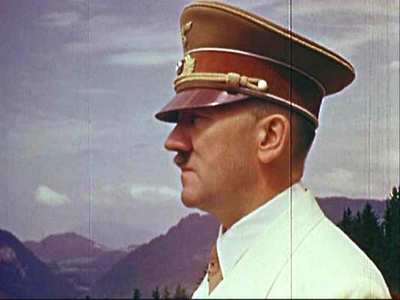
Video
Presented in 4:3 full frame, the pictures are understandably not in the best shape. Given that the interview footage is now over 30 years old and the majority of the archive footage is over 60 years old, then this isn`t that surprising. It`s still very much in a watchable condition though.
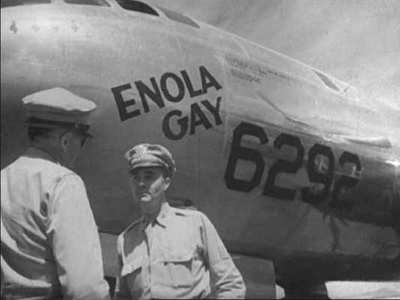
Audio
Dolby Digital 2.0 Stereo soundtrack that is more than adequate for presentation. Narrated superbly by Sir Laurence Olivier who brings the correct level of gravitas to this very human story, Eric Porter takes his place to narrate the moving 2 part serial The Final Solution. The music contained is a mix of commissioned score and original music of the time, either that used on existing newsreels or popular music of the time. Obviously special mention must go to the stirring theme composed by Carl Davis that accompanies the striking opening titles.
One disappointment is the complete lack of subtitles, which a title of this stature really does deserve but which presumably the budget couldn`t stretch to covering the entire 35 ½ hours.
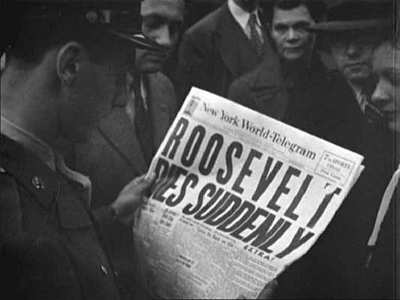
Features
More than you can shake a stick at, most produced in conjunction with the Imperial War Museum. There are timelines (which also show where each episode fits in the grand scheme of things), biographies of the major players, Imperial War Museum photo galleries, plus other extras that effectively take you back into each episode. All of the above appear on each disc.
Discs 8 to 11 contain either special featurettes for the 30th Anniversary of this collection or special episodes that were never transmitted originally, all listed below.
Making Of - a good 50 minute documentary with producers Jeremy Isaacs who goes into some detail on what they hoped to achieve and how they set about doing it. Isaacs covers things like the use of footage and trying not to use set up footage unless they really couldn`t help it, and even then forewarning the viewer on that score. Isaacs was also adamant that the primary aim was to show the effect on the person at the bottom rather than providing a top down view of the war, and explains some of the effort that went into getting some of the most extraordinary eye witness accounts seen at the time.
Secretary to Hitler - interview with Traudl Junge who got to tell more of her story in this special episode, which lead first to her book and then to the film Downfall in 2004. The interview with Frau Junge was a complete fluke as one of the original targets, a female journalist, suggested interviewing her neighbour, but no one realised the importance of what she could bring.
From War To Peace - interview with author Stephen Ambrose (Band of Brothers, D-Day, etc) looking at the aftermath of World War II.
Warrior - a very measured look at combat during World War II, just using the men who fought and allowing them to tell their stories.
Hitler`s Germany: The People`s Community 1933 - 1939 - long documentary of about an hour and a half looking at the period up to the invasion of Poland. Covers the major political events in Germany during this period and the hopes of many of the German people to avoid war. What is quite stunning is the realisation that many of their personal freedoms were willingly given away to the State in the belief that it would protect them from perceived enemies such as the Jews or the Communists - something that many people is still going on today with both the UK and US governments.
Hitler`s Germany: Total War 1939 - 1945 - second part of the documentary looking in-depth at the Nazi regime, this time looking at how the ordinary population coped with mass bombing, the Russian invasion and how old and young alike willingly threw their lives away in order to protect a dying country.
Two Deaths of Adolf Hitler - a look at the last days of Hitler and examining how he actually died. Was it cyanide, a self-inflicted gunshot or both? Interviews with staff in the bunker at the time, and Russians and British personnel involved in the investigation.
The Final Solution Parts 1 & 2 - mind-blowing and powerful documentary that examines the Nazi racial doctrines on Aryan superiority and the Jewish `problem`. Lasts nearly 3 hours in total and includes a lot of disturbing footage and interviews. What strikes me as the most disgusting thing about the whole of The Final Solution programme is that the Nazi`s effectively charged the Jewish people to be killed by making them sell their belongings, make them pay for train tickets to the likes of Auschwitz and in the final humiliation, stole the clothes off their backs, cut off all their hair and stripped out gold teeth for the benefit of the Reich`s coffers. It would be bad enough that a nation, albeit most unwittingly, would wish to annihilate a race, but to charge them for the privilege is beyond belief. This two part documentary is the only programme without the famous theme tune or any incidental music, the last couple of minutes panning over the remains of Auschwitz in complete silence.
Making Of Series- very detailed two-hour documentary covering virtually every aspect of making this definitive series. Main speaker is understandably producer Jeremy Isaacs, but members of the production team (writers, directors and researchers alike) all have their say.
Experiences of War - hour long piece that is essentially unseen interviews from the World At War archive from the Imperial War Museum. Some photo`s accompany the interviews but there is no narration on this piece at all.
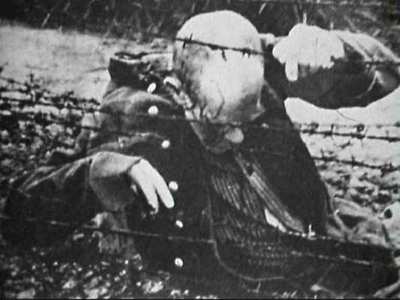
Conclusion
Another landmark review for me, number 200. I chose the Laurence Rees documentary series Auschwitz for number 100 and wanted something as powerful for number 200. A post-Christmas sale at Amazon allowed me to pick up this set for just over £50 and so another long-term purchase wish was made a reality. I`ve only just finished watching it as well, as the 35 and half hours has taken quite a bit of time to get through when you consider some of the other releases sent from the hallowed heights of Reviewer Towers.
Still, it was time well spent. I have childhood memories of this series and have always been interested in pre-war and wartime Germany through spending my childhood in that country as a Forces child. I actually spent a week at Wewelsberg in 1980 with my school, the SS Officers training school long converted into a Youth Hostel. My interest in this period is down to the fact that I still don`t really understand how an entire nation was gripped by the National Socialism of Adolf Hitler and not only followed him into war, but allowed him to pursue his racist Aryan agenda in their name. There is shock amongst so many Germans as to the Final Solution and the death of so many Jews, Poles, Russians and gypsies, but all the signs were there from the moment that the Nazi`s gained power and instigated their anti-Jewish propaganda. The most disturbing part of all of this was that the Jews were not only systematically persecuted and exterminated on the same level as vermin, but that they were essentially forced to pay for their own murders and their possessions confiscated for the Reich to fund a shoddily thought-out war campaign. How much more different could it have been if more people had been willing to take a stand or if Hitler had curbed his expansionist dreams until such a time as he was ready to strike properly rather than rushing into campaigns that hinged on the capture of enemy assets? Certainly Operation Barbarossa was that step too far and which would ultimately lead to the end of the war.
Swiftly moving back to the series itself, Jeremy Isaacs and his team have created a meticulous and detailed record of some of the most extraordinary events of this period and for the first time (at the time) brought a remarkable human tone to the story. By not focussing purely on the Generals or the battles but instead the effect on the civilian populations and what it was like on the various home fronts, you get a much more rounded picture of what it was like to have experienced that war from all sides. The team felt that they could not bias the story in any way, and so the Germans involved get to tell their stories without any pre-conceived bias or editing to make them seem less sympathetic. Clearly some are not that sympathetic at all, there can be no doubt surely that the likes of Karl Wolff and Albert Speer (two extremely high-ranking Nazi`s) knew about the Final Solution, but it is left to the viewer to decide whether they are telling the truth or not.
The footage used within this film is also quite remarkable, a mix of combat newsreel, newsreel and propaganda film. Oddly it appears from the interviews with the production team that it is the British films that are more likely to be faked, along with the Russians who were slightly cleverer at it. The German films are remarkable in how powerful Nazi propaganda was, even if it does look rather simplistic now to our more sophisticated eyes (although you could argue the same thing about Global Warming). Clearly some of the footage is not of a high quality but it is all very watchable and allows you to get that much deeper into the psyche of the time. The very human interviews also allow you to view and understand events at the very basic of levels rather than the dry commentary of Generals depicting the order of battle. History is always subjective and it`s true that the winners get to re-write history in their own words, but it`s the people whom history forgets rather than the pivotal figures who tell its truest story.
What is very clear from this series though is that the majority of themes covered during this series (genocide/ethnic cleansing, nationalism, terrorism, propaganda) are still very much prevalent today in one form or another. We should be learning from history, instead we are doomed to repeat the mistakes of the past. Despite covering all major campaigns during this war, the series returns time and again to the behaviour of German soldiers during the war. All of the misconduct is placed at the doors of the SS, which was fashionable at the time, whereas we now know that some SS were not guilty of some of the atrocities blamed upon them and also that ordinary soldiers of the Wehrmacht were just as guilty. What is clear is that for the first time, we have accurate recordings and testimony of the kind of behaviour that shows humanity at its basest. What allowed these men (mostly) to act in this way against fellow human beings? How was it that they believed they could get away with it?
Clearly this series still doesn`t tell the whole story of the Second World War, the canvas is far too broad for that, but it`s ambition is matched with a focus on detail and so the viewer is left with an innate understanding of the topics covered. Overall this is without doubt the greatest documentary series ever and an important historical document for anyone who wishes to research this era in detail.
Simply stunning and a must-have…
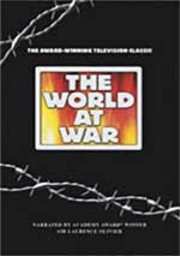




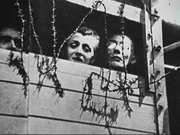
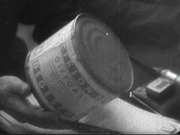
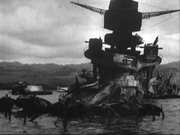
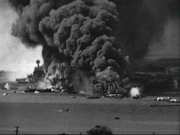
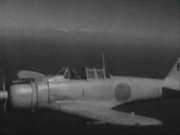
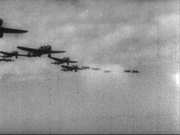
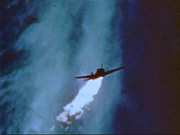
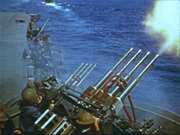
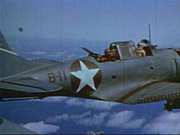
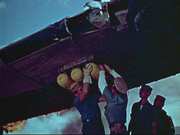
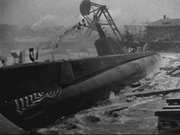
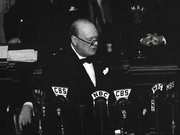
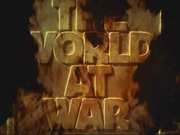
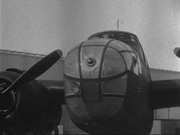
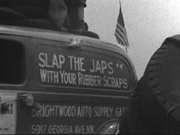
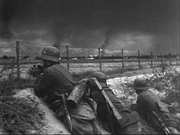
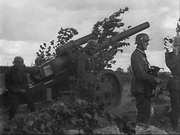
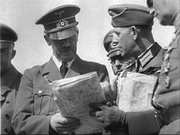
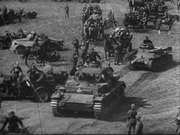
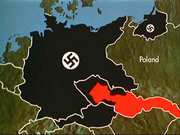
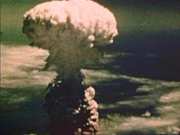















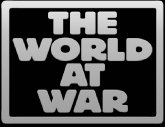

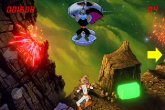












Your Opinions and Comments
Be the first to post a comment!